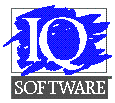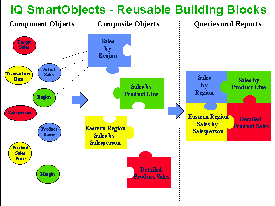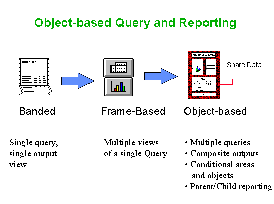Object Technology Comes to Query and Reporting Why is there a fundamental need for object technology?
Why is there a fundamental need for object technology?
How does IQ/Objects leverage object technology?
WhatÆs a SmartObject?
What functionality is delivered in IQ/Objects through SmartObjects?
What is the impact of IQ/Objects on query and reporting?
What benefit does IQ/Objects deliver to an organization?
Why is there a fundamental need for object technology?
As object technology became further entrenched in software solutions, it was only a matter of time before the
compelling technical and economical benefits were extended into the domain of business-user data access and
analysis. From a business intelligence perspective object technology can enable query and reporting solutions to
deliver end user simplicity while providing more powerful functionality. This results in better positioned business users who can systematically transform data into relevant information on a timely basis in order to support better decision making.
This need for an object-based solution will be further exasperated by data warehousing initiatives and the empowerment of data accessibility throughout the enterprise. The availability of data, typically from multiple, often times heterogeneous sources, will also further drive the need to support more complex queries from larger numbers of users.
IQ Software is one of a few vendors that have introduced object technology to the query and reporting tool segment with their IQ/Objects product.
How does IQ/Objects leverage object technology?
IQÆs approach to delivering an object-based query and reporting environment is based on two key underlying technology foundations: IQ SmartObjects and the Knowledge Base Manager.
IQ SmartObjects are essentially prefabricated query building blocks that serve as the fundamental components of IQÆs object approach. Users or IT organizations can build new SmartObjects using IQ/Objects, reuse existing ones for query and report execution, or combine multiple SmartObjects to create ever more increasing complex queries. The ability of IQ SmartObjects to share and format information enables users to generate multiple queries in a single request, share data among queries and query results, and integrate and correlate output from multiple queries within a single document or report.
In order to foster reuse, SmartObjects must be accessible from a managed environment; therefore, IQ has deployed the Knowledge Base Manager as an object repository for storing and managing SmartObjects. IQ/ObjectsÆ users then access these objects ôas isö or for assembling more powerful queries and reports. The Knowledge Base Manager provides additional functionality beyond an object repository, most notably in its ability to configure and maintain access to multiple databases, creation and maintenance of a semantic layer that hides the complexities of SQL, and automatic configuration of joins including path optimization of multiple joins.
WhatÆs a SmartObject?
SmartObjects can be composed of the following three sub-object types:
- Component Objects
Form the fundamental building blocks of any query. They may include a database column, a calculated field, a bit-map and/or OLE object. Component Objects allow business users to easily identify and work with data elements. Within these objects, cryptic column names can be mapped to meaningful terms; columns can be combined from multiple tables and databases; and formatting and other attributes for the object can be assigned.
- Composite Objects
Provide the real power in IQ/Objects. Composite Objects contain much more than simple data elements and may contain complete application logic. Each composite object is a complete query or set of queries that may be directed to its own data source. Any number of multidimensional cross-tabulations, 2D and 3D charts, and complex free-form queries can all be contained in a single composite object.
- Area Objects
Serve as containers for multiple component and composite objects. Like other objects, Area Objects share a number of common attributes. For example, you can set attributes for borders, background, when to output (or activate), etc. They are used to define sophisticated output documents with limitless flexibility. Examples of Area Objects are document header, page header, group header, detail and footer, etc.
A key critical aspect of SmartObjectsÆ power lies in their ability to serve as reusable ôbuilding blocksö enabling users to take advantage of the power of reusability for building sophisticated reports without resorting to programming. However, SmartObjects are not simply static structures or containers. They possess inherent behaviors which deliver the true power of IQÆs object approach including:
- Intelligence
SmartObjects can consist of data, logic, and formatting information. Unlike most existing query and reporting tools that only support the aggregation of formatting information, IQ/Objects additionally supports the aggregation of data access operations across multiple related objects.
- Inter-object communication
SmartObjects can seamlessly (from an end userÆs standpoint) share data, as well as query results. This rich data interchange functionality allows the development of powerful queries (even across heterogeneous databases) and reports without the need for 3GL or 4GL programming.
Thus, IQ SmartObjects share three characteristics with other implementations of object-oriented technology:  inheritance, or the ability for objects to pass their attributes to other objects; polymorphism, the ability of two or more objects to respond differently to the same command; and encapsulation, the ability to combine data and logic (even formatting characteristics) into a single object.
inheritance, or the ability for objects to pass their attributes to other objects; polymorphism, the ability of two or more objects to respond differently to the same command; and encapsulation, the ability to combine data and logic (even formatting characteristics) into a single object.
IQÆs approach in the domain of query and reporting solutions is unique because of its ability to reuse intelligent objects that can communicate and share data. From an object technology perspective IQ/Objects also remains unique because of its ability to reuse intelligent objects that can communicate and share data. Other industry vendors label their database columns as ôobjectsö simply because they contain formatting information.
What functionality is delivered in IQ/Object through the implementation of SmartObjects?
An architecture is only as good as the compelling functionality that it enables. SmartObjects as intelligent building blocks enables IQ/Objects to deliver the following functionality:
- Multiple Queries
Leveraging the reusability of objects defined in IQ/Objects, a single user request may contain multiple queries (handled via inter-object communication) with each query having its own data source, thereby providing true heterogeneous data access
- Composite Outputs
The output from multiple queries can be combined, consolidated and correlated into a single document, enabling IQ/Objects to go beyond simple frame-based reporting. The inter-object communication capability of IQÆs SmartObjects enables this functionality to occur without the need for 3GL or 4GL programming.
- Parent/Child Reporting
The output from queries developed in IQ/Objects can be used to drive additional queries enabling true heterogeneous data access: a function typically achieved through application programming in a 3GL or 4GL prior to IQ/Objects.
- Conditional Areas and Objects
Objects can be activated or inactivated depending upon certain conditions providing an easy vehicle for monitoring the business through exception highlighting, generating alerts, or driving variable outputs. Each object can also have unique formatting options specific to that object.
- Report Templates / Style Guides
Formatting attributes such as fonts and borders can be saved as a style guide and applied to new or existing objects, thus providing the ability to set and enforce consistent look-and-feel within an organization. IQ/Objects also includes prepackaged style guides providing a variety of formatting options.
Object technology has enabled IQ/Objects to go a major step beyond todayÆs ôbandedö and ôframe-basedö tools ù introducing an entirely new paradigm ù ôobject-basedö query and reporting. By allowing business users to initiate  Object Based Query and Reporting multiple queries from a single user request and combine, consolidate and correlate the corresponding multiple result sets (plus OLE objects, bit mapped images, etc.) into a single document, IQ/Objects delivers powerful functionality that frame-based reporting solutions deliver with multiple manual steps, or 3GL/4GL programming.
Object Based Query and Reporting multiple queries from a single user request and combine, consolidate and correlate the corresponding multiple result sets (plus OLE objects, bit mapped images, etc.) into a single document, IQ/Objects delivers powerful functionality that frame-based reporting solutions deliver with multiple manual steps, or 3GL/4GL programming.
The rich functionality found in IQ/Objects recently earned it an Editors Choice Award from BYTE Magazine, as one of the top hardware and software products for 1995. This award is representative of products applying technological innovation for significant improvement in usersÆ ability to more effectively solve problems. IQ/Objects was the only business intelligence tool chosen and shares the award with such software products as Windows 95, Netscape and Java.
What is the impact of IQ/Objects on query and reporting?
The reusability of intelligent objects that can inter-communicate delivers compelling benefits over the traditional query and reporting paradigm. Multiple queries and the correlation of the corresponding result sets provide significant end user performance improvement over non-object solutions where this is typically accomplished manually with a product like MS Excel. Likewise for multiple queries in a heterogeneous environment, IQÆs inter-object communication reduces the number of database interactions required for accessing data from multiple database servers. Functionality becomes especially important in data warehousing environments where multiple queries are required because a single query is no longer sufficient for decision making.
Significant productivity and functionality benefits are also passed to the traditional area of production reporting. The rich functionality of IQ/Objects enables the development of complex queries and reports, virtually eliminating the need to program in a 3GL or 4GL which results in a significant savings in conventional production reporting labor. Conditional objects and printing enables conditional reporting where many reports can be combined into a few powerful ones thus reducing maintenance, backlog, and processing time. The power of IQ/Objects also opens up production-like reporting functionality to non-IT personnel, reducing the overhead for IT management.
The reusability of predefined (and often times proven) objects eliminates the time-consuming and error prone process of formulating queries. Novice users can leverage ôbest-in-classö queries and reports either by assembling SmartObjects or initiating canned reports that have been built by IT or power users within the enterprise. Power users can avoid repeated queries in order to build their way toward more complete answers to complex questions.
What benefit does IQ/Objects deliver to an organization?
It was only a matter of time before the compelling technical and economic benefits of object technology extended into the domain of business-user data access and analysis.
When applied to query and reporting, object technology delivers:
- complete functionality to meet the diverse business needs and skill sets with a single tool-set. The scalability of IQ/Objects delivers functionality for novices, power users, and developers. This provides a single, consistent enterprise query and reporting solution that addresses everyoneÆs needs.
- powerful data access and reporting functionality, especially critical for taking advantage of the many data warehouses being deployed. This power also brings traditional production reporting functionality to the user domain, removing the requirement for application development expertise (manageable through IQÆs three-tiered data access and reporting solution, IQ/SmartServer).
- productivity gains across an organization. With IQ/Objects, novice and power users are empowered and become self-equipped for data access and reporting without IT intervention, effectively bringing ad hoc query and reporting to the masses. This also translates to reduced labor costs, especially in the area of production reporting (no programming, reduction in total number of reports, etc.).
As organizations begin to more systematically transform data into information, an object-based architecture becomes even more critical as an enabling technology. As data warehouses continue to empower users with access to enterprise data, such an architecture increasingly becomes imperative for organizations looking for a scaleable solution.
 Why is there a fundamental need for object technology?
Why is there a fundamental need for object technology? inheritance, or the ability for objects to pass their attributes to other objects; polymorphism, the ability of two or more objects to respond differently to the same command; and encapsulation, the ability to combine data and logic (even formatting characteristics) into a single object.
inheritance, or the ability for objects to pass their attributes to other objects; polymorphism, the ability of two or more objects to respond differently to the same command; and encapsulation, the ability to combine data and logic (even formatting characteristics) into a single object.
